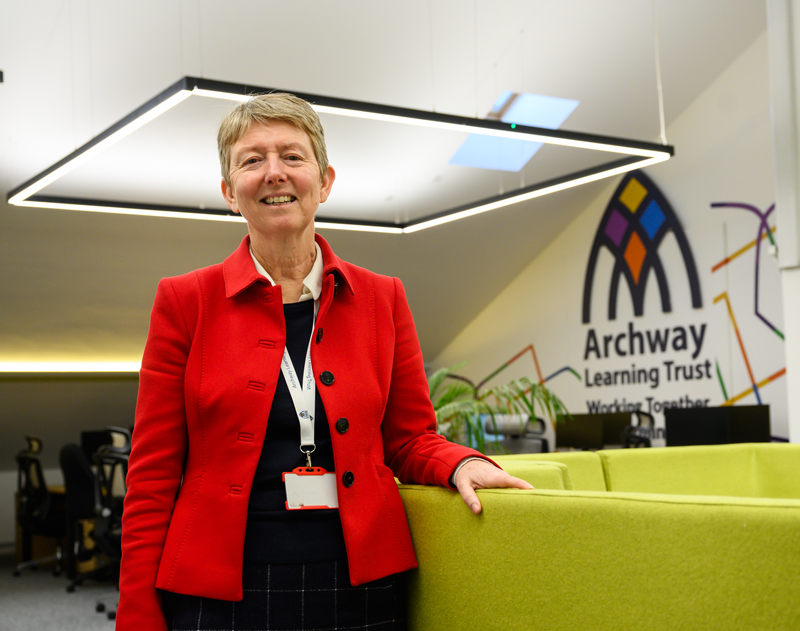Diversity, deprivation and tackling parents’ abuse of home education – Sian Hampton tells Jack Dyson about a life that has taken her from Uganda to leadership of the Archway Learning Trust
Labour’s surprise assault on academy freedoms has caused consternation across the sector.
But for the Archway Learning Trust, it has already had a more tangible effect; long-term plans to fast-track staff onto leadership wages are now on the backburner, says chief executive Sian Hampton.
Education secretary Bridget Phillipson was forced into a U-turn on restricting academy pay freedoms – saying she would instead introduce a “floor” but “no ceiling” on pay and conditions.
But Hampton believes the damage has already been done.
“Parts of the bill were a real distraction,” she says. “Academy terms and conditions – did we really need to talk about that now?
“I don’t know if the government is for or against trusts, but the mood music makes trusts feel they are maybe less valued than they were in the past.”
From Uganda to Burton
We meet in a bustling café in the middle of London’s St Pancras Station. Having arrived from Nottingham with a large holdall containing freshly laundered clothes, Hampton is stopping here before hopping on a train to Bristol to spend the weekend with her daughter.
She intends to work remotely for the rest of the day. I later learn she remained glued to her laptop after checking into a Bristol branch of Premier Inn that evening.
Born in 1966, Hampton spent the first four years of her life in Uganda. Her parents had moved to the country to teach.

“It could have been Canada or Uganda, but they got the Uganda job first. They were constantly taking us out on safari, not that I remember much about it.”
They moved to Burton-on-Trent in 1970. Blood-thirsty dictator Idi Amin seized power 12 months later, prompting many of the family’s friends to flee the country.
Hampton’s “ambitious” father frequently switched headteacher jobs, causing the family to regularly relocate too.
After leaving school, she read history at Cambridge University.
Her first job was working in a Wolverhampton halfway house. The building was equipped with emergency buttons, but she says it was “never somewhere I really felt frightened”.
“Working with blokes who’ve just come out of prison was an eye opener.
“I ran basic cooking courses. That was always interesting as you never knew how it was going to go – you were giving these ex-offenders knives and all sorts.”
Hampton then moved into secondary teaching. But it wasn’t until she took over as deputy head at Bluecoat Aspley in Nottingham that she encountered “inner-city diversity”.
“There were cultural things I needed to learn about children who came from different backgrounds to my own. The level of SEN, I hadn’t seen that before [as well].
“I love that vibrancy – I couldn’t go to a monochrome school and work out in the shires now.
Boot searches and arrests
At times, though, there “was an edge”.
Once, she was asked to search a pupil’s boot amid fears they were armed. On another occasion, police descended on the secondary to arrest “members of the school community because they were involved in gangs”.
Having risen the ranks to executive headteacher at Bluecoat, she became Archway’s founding CEO in 2012.
The trust consists of 10 schools mostly spread across Nottingham and Derby. Some have “70 per cent pupil premium”, while “others are 30 per cent”.
Instead of taking a “one-size-fits-all approach” to running the academies, the 58 year old ensures “heads are autonomous” as they are “uniquely placed to understand their own communities”.
“We don’t pretend [the schools are] all the same”, she tells me. “However, there are key facilities that we run through the central team.
“The intention of all of that was to reduce workload on our heads and to allow them to maintain and sustain teaching and learning.”
Advisory board longevity
Hampton also sits on the Department for Education’s east Midlands advisory board. The meetings are intended to inform regional director rulings on trust growth plans.

At their best they are “really rich and informed conversations that I hope help DfE make their decisions”, she says.
At their “worst” they’re presented with proposals “where so much development has gone on that saying no is actually going to undermine something that’s happening already” – even if the project isn’t the best long term.
With the likes of the academy conversion grant and trust capacity funding cut completely, Hampton thinks there could be “a drying up of people wanting to academise”.
“With the launch of the RISE teams, is the regions’ work going to be less about managing conversions [and] more about school improvement, which is not what the advisory board is there to do?
“I don’t know how much longevity they [advisory boards] have going forward in this new educational landscape.”
RISE team ambition
Hampton has thrown her hat into the ring to join the new RISE teams: groups of DfE officials and turnaround leaders charged with brokering support for struggling schools.
When the government’s vision for the school improvement teams was revealed in November, ministers said they wanted councils to help drive their standards agenda.
Just days later England’s biggest local authority admitted it could no longer afford to provide school improvement support.
Hampton has received similar messages from council chiefs in the Midlands.
“They’re saying, ‘We haven’t got the appetite or resources to run schools that are in difficulty ourselves. With 80 per cent of all secondary schools in trusts, why would we suddenly go into this place where we haven’t got the skills or the money to support?’”
Despite this, Hampton backs a number of Phillipson’s reforms. She regards the curriculum and assessment review as an opportunity “to make schools think about how children can be happy and successful”.
She also backs plans to tighten up elective home education (EHE) rules. One of her schools, Alvaston Moor Academy in Derby, welcomed around 193 children in-year over 2023-24. Thirty-six per cent of them had been home educated.
EHE how-tos on Facebook
Education Datalab analysis last year showed the secondary issued 176 suspensions per 100 pupils across 2022 and 2023. The rate was among the highest in England.
“The community there was playing games,” she says. “A child would get into trouble in one school and the parents would then choose to electively home educate and apply for a completely different school.”
“There were parent forums and all sorts of social media [groups] where it would say ‘how to home educate your child’.”
She claims some leaders in the area have also told the parents of misbehaving kids: “We’re looking at permanent exclusion, but if you prefer to educate your child at home, then we won’t take that final step.”
The children accepted into Alvaston Moor through this route “usually need really bespoke support” to reintegrate them into classes, which “costs money”.
“I’m not saying it [the exclusions] is all EHE, but I think those that come through fair access and have failed in other schools are usually the ones that come to us and fail again,” Hampton stresses.
Alvaston Moor managed to reduce suspension rates to 12.3 in the autumn. Since the start of the academic year, it has held 10 in-school meetings with parents every day.
Archway also invested £1.5 million in “an internal AP and intervention system”, recruiting staff to work with children with additional needs.
Being CEO a ‘24-hour responsibility’
Hampton spends half her week working from the trust’s central team base on Bluecoat’s top floor.
The rest of the time she hot-desks during visits to the rest of her schools. She rails against the notion of having a separate office building for central staff.
“I hate the idea of me somehow being in an ivory tower and making edicts. I still pick up litter [and] challenge children to tuck their shirts in.”

A working group has been assembled at Archway to examine “how we can make working in our trust as attractive as possible”. It hopes to do this in ways that aren’t to “the detriment of other players nearby”.
One of the measures being looked at is the leadership pay fast-track. Under the plans, experienced staff will be able to skip the final upper pay scale level and move onto the leadership spine.
The move will cost up to £30,000 to implement. But Hampton says the plan is “still very much paused” and expects it to be examined again in September.
The idea is that employees could move into assistant head roles sooner, and give leaders the chance to ask them to “do other stuff as well” as they won’t be “beholden to 1,265-hour” rules, Hampton reasons.
“So, they’ve got more flexibility and so do we. I think it would allow us to be more imaginative in what we’re doing, rather than being rigidly attached to teachers’ pay and conditions.”
The delay means the plans will likely be someone else’s to implement. Hampton will retire in August – saying it is time to make way “for somebody new with fresh ideas”.
“Carrying the responsibility of the trust is a 24-hour-a-day role. You just know that if something happens, it’s you who’s got to respond. It’s a big responsibility.
“I’ve got enough of my career left to go off and explore different things. I didn’t want to go on for so long that people were saying, ‘She should have left years ago’.”














Your thoughts